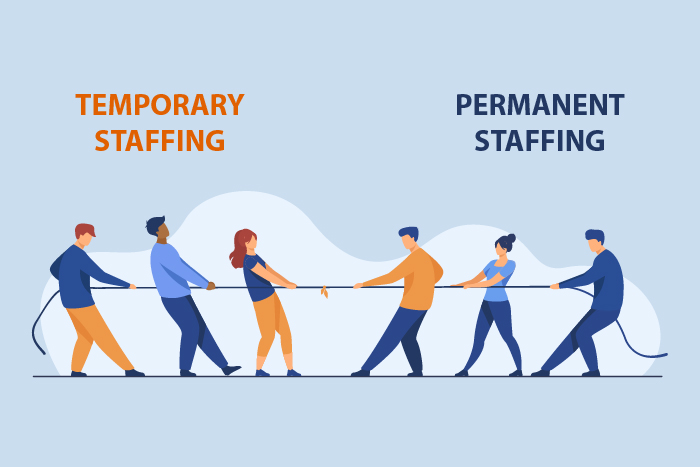Choosing Between Temporary and Permanent Staffing for Your Company

19.03.2024
In modern workforce management instances, companies often face a dilemma: should they go for temporary or permanent staffing? Both options have advantages and considerations, which are crucial for organizational success. Let's explore the details of temporary and permanent staffing to help you make the right choice for your company.
Temporary Staffing: Flexibility at its Core
Temporary staffing, also known as contract or contingent staffing, provides companies with the flexibility to meet short-term staffing needs without the commitment of permanent hires. This setup is beneficial for projects with defined timelines or seasonal workload fluctuations. Companies can adjust their workforce size as required by utilizing temporary workers and staying agile in response to market changes. They were able to determine the following concepts into a huge line setup for them.
One key advantage of temporary staffing is the access to specialized skills for short-term projects. Whether it's a specific technical skill or industry expertise, temporary workers can bring in the required expertise without the long-term financial commitment of permanent roles.
Moreover, temporary staffing allows companies to test candidates before making a permanent decision. By evaluating a candidate's performance and fit during their temporary tenure, organizations can make informed decisions about permanent offers in the future.
However, it's important to note that temporary staffing also has its challenges. Maintaining team cohesion can be challenging with a revolving door of temporary workers. Concerns about knowledge transfer and continuity may arise, especially in roles requiring ongoing collaboration.
Permanent Staffing: Establishing a Strong Foundation
In contrast to temporary staffing, permanent hires bring stability and continuity to organizations. Investing in permanent employees not only fills immediate staffing needs but also lays the groundwork for long-term success. Permanent placements are ideal for roles critical to the organization or requiring deep institutional knowledge.
One major benefit of permanent staffing is the potential for talent retention and career growth. Competitive salaries, benefits, and advancement opportunities can attract top talent and foster loyalty, leading to higher engagement, productivity, and innovation.
Additionally, permanent placements contribute to organizational stability and culture. When employees feel secure and aligned with the company's mission, they are more likely to work towards strategic objectives, promoting collaboration and business success. However, permanent staffing also has its considerations. Upfront costs like salaries, benefits, and onboarding expenses can be significant. A higher risk is involved, as companies must ensure they are making the right long-term investment in each hire.
Finding the Right Fit: Balancing Act
In reality, the choice between temporary and permanent staffing is not clear-cut. Companies must weigh the pros and cons of each option to find the best fit for their specific needs. A hybrid approach that combines temporary and permanent staffing elements might be the most suitable in many cases.
Ultimately, whether you choose temporary or permanent staffing, aligning your strategy with organizational goals and values is crucial. By understanding the nuances of each option and making informed decisions, you can build a workforce that supports success and resilience in a dynamic business environment.














































































